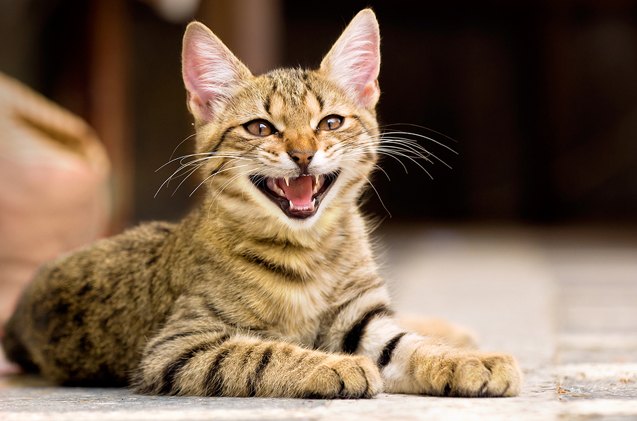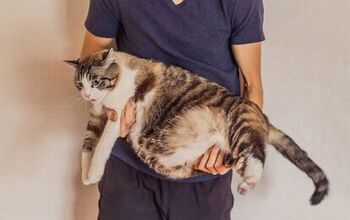Purr-fect Guide to the Sounds Your Cat Makes

In addition to body language, your kitty communicates with you using a variety of sounds. Knowing how to decipher these sounds will help you better understand what your furry friend is trying to say.
The short guide below is a good place to start, but keep in mind that every pet is unique, so get to know your cat by spending time with him and learning his ways.
The Classic Meow
Kittens meow to call out to their moms, but they tend to meow less often as they get older if they live outdoors. Even though cats in the wild don’t meow to one another to communicate, kitties who end up living indoors with people will use this sound to talk to their human family.
Related: Tell-Tale Signs Your Cat May Be in Pain
If your cat meows, he probably wants something, whether he’s hoping to play or eat, as a couple of examples. Or you may find that your kitty says meow simply to say hello.
Beware, though, that meows can also indicate discomfort, illness, or loneliness. Older felines, for example, might end up meowing more often because they feel anxious when they’re alone or because they can’t see or hear well. If your cat is meowing a lot more than usual, a trip to the vet may be warranted to make sure he isn’t hurt or sick.
As you get to know your kitty, you’ll be able to decipher his different meows, such as those that are done in succession or those that are longer. Depending on how your cat meows, you’ll be able to determine if he’s feeling annoyed, if his vocalizations indicate objection, or if he’s asking for something.
The Comforting Purr
When your kitty purrs, he’s likely feeling relaxed and content, though scientists have also stated that cats may use purring to heal themselves.
Related: 6 Easy Ways to Make Your Cat Happy
Just keep in mind that this familiar feline sound may also indicate that your cat isn’t feeling too well or that he’s agitated, threatened, or nervous. To determine whether the purr is a happy one or not, you can look at your cat’s body language for other clues.
The Intimidating Hiss and Growl
When a cat hisses, he’s trying to let you know that he’s prepared to fight if necessary. He likely feels threatened or is extremely agitated and wants to let you know that it’s your last chance to back off.
Even a shy kitty who isn’t sure of a situation may feel the need to hiss, and abused felines or those who have lived as strays won’t hesitate to hiss if they want you to stay away.
Hisses are sometimes accompanied by deep growling sounds, which also indicate that a cat is territorial, angry, fearful, or agitated. A cat who is growling will likely be puffed up, with his tail wagging or twitching, his ears back, and his back arched. These are all signs that he’s ready to strike, so it’s best to stay away.
The Adorable Chirps and Trills
Chirps and trills are very cute, and they’re also learned during kittenhood. If you’ve ever seen a mother cat interacting with her litter, you might’ve heard her chirp and trill to get them to follow her or pay attention. Adult cats may also use these sounds to speak to one another or to tell you to come look at something.
The Strange Chatter
If your cat has ever stared out the window to catch a glimpse of local wildlife, you may have heard him make a strange chattering sound. This is thought to indicate his frustration or excitement as he focuses on potential prey that’s out of reach.
The Distressed Yowl
One sound that cat owners don’t want their kitties to make is the yowl. This is a loud, long, drawn out meow that sounds more like a moan and indicates negative emotions, such as discomfort, worry, distress, or pain.
Elderly kitties may yowl if they suffer from conditions such as cognitive disorders that make them feel disoriented. Intact felines could also yowl to find a mate, or a cat might yowl at another feline to tell him to stay away.
If your cat is yowling a lot, he may not be feeling well, so it’s a good idea to have him checked by a vet. And if there aren’t any health concerns and your kitty is still yowling, it may be a sign of boredom, so giving your pet extra attention might help.
Cats make a lot of different sounds to let you know how they’re feeling. Get to know your kitty by really paying attention to his vocalizations. You may be surprised by how well these fur babies can communicate with you.

Lisa Selvaggio is a freelance writer and editor, and our resident cats-pert, with certifications in pet nutrition and pet first aid. She enjoys producing content that helps people understand animals better so they can give their pets a safe and happy home.
More by Lisa Selvaggio























